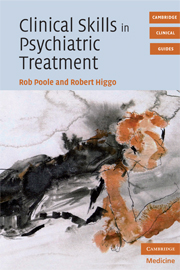Book contents
- Frontmatter
- Contents
- Acknowledgments
- Author biographies
- Introduction
- PART I UNDERLYING PRINCIPLES
- PART II THE CONTEXT AND LOCATION OF TREATMENT
- PART III PROBLEMS IN TREATMENT
- 11 Engagement
- 12 Compliance and concordance
- 13 Treatment resistance
- 14 Complicated problems
- 15 Managing risk
- 16 Staying well
- PART IV COPING
- Afterword: Optimism of the will and pessimism of the intellect
- References
- Index
11 - Engagement
from PART III - PROBLEMS IN TREATMENT
Published online by Cambridge University Press: 08 August 2009
- Frontmatter
- Contents
- Acknowledgments
- Author biographies
- Introduction
- PART I UNDERLYING PRINCIPLES
- PART II THE CONTEXT AND LOCATION OF TREATMENT
- PART III PROBLEMS IN TREATMENT
- 11 Engagement
- 12 Compliance and concordance
- 13 Treatment resistance
- 14 Complicated problems
- 15 Managing risk
- 16 Staying well
- PART IV COPING
- Afterword: Optimism of the will and pessimism of the intellect
- References
- Index
Summary
The way that lives are led has a profound effect on physical and mental health. Personal well being depends on the things that people do each day. Unfortunately, no matter how healthy a lifestyle might be, everyone eventually develops illnesses and diseases that affect the ability to function. Technical treatments, such as medication, can control illness, but the existence of a technical treatment is not sufficient to return people to good health. Throughout medicine, and especially in psychiatry, patients have to participate in or co-operate with interventions if they are to be successful. They have to modify the things that they do every day in order to get better. Recovery is always an active process on the part of the patient.
Helping people to do the things that are necessary to recover is the core business of mental health care. It depends on the clinician's ability to form plans with patients, which involves continuing negotiation and discussion. This in turn is based on an important process that underlies all therapeutic progress. Treatment cannot progress unless the patient has engaged with the clinician.
Engagement is a first step and a continuing issue in treatment. It is a prerequisite to the formation of therapeutic relationships. Clinician and patient are both active agents in engagement. In clinical practice, engagement refers to the process by which clinician and patient start to do business with each other. Metaphorically they engage as cogs in a machine engage.
- Type
- Chapter
- Information
- Clinical Skills in Psychiatric Treatment , pp. 111 - 120Publisher: Cambridge University PressPrint publication year: 2008

